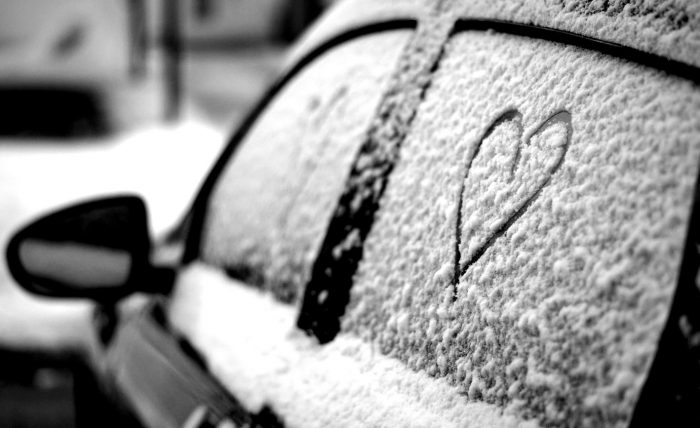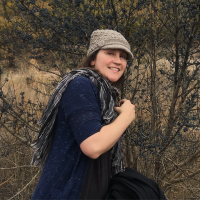It wasn’t a random act of kindness that shifted me from frustration to freedom. It was a random act of connection.
“That’ll be $42.16.”
I fumbled with the brass latch on my crumpled leather wallet and folded open the flap, absentmindedly slipping my thumb into the slot where my debit card would be. Expecting to feel the glide of smooth plastic, instead, my thumb met only the waxy texture of bare leather.
I reached in again, more deeply this time, feeling for the hard edge of my card. “It must just be stuck a little further down,” I thought.
But, nothing.
I snapped to attention and looked down at my hands. Instead of seeing my emerald green debit card peeking from its usual cozy wallet home, I saw only an empty slot. My eyes widened. My card was missing.
A shudder of embarrassment rushed over me as I stood at the checkout, groceries bagged, no means to pay. My mind raced backward in time over the last few hours, reverse stepping through the moments of my day. Where was my card? When was the last time I used it?
Then, I remembered.
When I had walked into the store not an hour earlier, I had been feeling small, scattered, and broken. I was not thinking at all about my debit card. I had just come from the doctor’s office, where I had made an appointment for a routine physical exam, hoping for a referral to address a shoulder injury.
Once there, instead of being asked about my shoulder, I was drilled about every potentially negative detail of my medical history that had ever (or never) existed: my previous injuries and illnesses, my risk factors, my surgeries, my medications, my unwillingness to get a flu shot.
The doctor, younger than me, made a point to remind me that I am “not getting any younger.” He then proceeded to forewarn me of the cascade of preventative measures I would need to take immediately in order to avoid imminent decline and future decrepitude.
“Shall we schedule you now?”
After being prescribed tests, drugs, bloodwork (just in case), and multiple follow-up visits, I sheepishly slipped back into my woolly sweater, and left the office feeling two inches shorter than I had when I walked in.
On my way out, I paid for my declining person’s medication at the pharmacy, folded the receipt next to the debit card in my hand, and left the building. Getting into the car, I mindlessly tossed all of it onto the passenger seat while I turned the key in the ignition. I was lost in thought: “Why did I let him do that to me?”
By the time I got to the grocery store, my mind was tipsy with frustration. Feeling small, broken, and “not getting any younger.” Annoyed with the system. Even more annoyed with myself.
I wandered the food aisles lost in thought, smiling at people I passed but feeling empty inside. I stuffed cereal and coffee into my basket with an extra little shove of annoyance. Objectively, I knew that my uncomfortable feelings were temporary, that they would move through me in time, but I struggled to breathe inside them nonetheless.
It was in that compromised state that I went through the checkout line, bagged my groceries, and realized I couldn’t pay.
Where was my card? It was on the passenger seat.
I looked up apologetically at the checker. “I’m so sorry. I’ve left my card in the car. I just need one minute to run out and get it. I’ll be right back.”
I glanced over my shoulder to look at the man in line behind me, a peachy cheeked older gentleman with a kind smile, cradling three or four small items in his hands. “Please,” I said to the checker, “Check this gentleman out while you’re waiting for me if you can.”
I nodded at the man. “Sorry, sir.” And I ran out to the parking lot.
As expected, I found my card lying in the passenger seat, next to the receipt from the pharmacy where I had mindlessly tossed them both. Rolling my eyes at my lack of consciousness, I snatched up my little bank-issued jewel and headed back into the store.
The checker had been able to check out the man behind me, and he was wrapping up his purchase as I arrived back at the counter. I gave him another nod and got in line behind him. As he walked away, I passed my card to the cashier. “Sorry about that. It was right there on the seat where I left it.”
She waved away my card with her hand. “Nah, you’re good.”
I looked at her, confused. “I’m good? What do you mean?”
“I mean, you’re good. That man who was behind you just paid for your stuff.”
I froze and stared at her in amazement, wondering briefly whether she was making it up. She shrugged back at me and smiled. She wasn’t kidding.
Sucking in a breath of surprise, I grabbed my bag of food and ran outside to the parking lot. I saw the man walking away toward a scratched and beaten-up red Nissan truck. He walked slowly, silver hair reflecting the light of the afternoon clouds, a camouflage hunting jacket taking up most of his frame over a pair of crumpled jeans and black leather work boots.
“Sir!” I called to him as I approached from behind. He kept walking. “Hello, Sir?”
He turned to look at me, and his gait halted.
“Sir, did you just pay for my groceries?” I caught up close enough to see him wink at me, a sparkle in his eye.
“Who, me?” He raised his eyebrows. He was visibly pleased at my confusion.
I smiled, still shocked by the fact that my bulging canvas bag full of food had just been covered by his tab. “How generous of you to do that. Thank you.”
But he shocked me even more with his response.
“Don’t thank me, thank the store.”
I must have looked comically perplexed, because he chuckled, and went on.
“I love this store. It’s the only place I shop. I tell all my friends to come here. A lot of them are sick, and I tell them that shopping at this place is one of the best things they can do for their health.”
I understood. Organic, local, whole foods. Unpackaged and bulk. Humane standards. Compassionate business practices. This was hands down the best market in town.
He continued, a shadow of sadness falling over his face. “But my friends don’t listen; they won’t come. And, they just keep getting sicker.”
“So the best way you could thank me would be to keep shopping here. Take care of yourself and be healthy. And support the good work these people are doing, so other people can be healthy too.”
I nodded in agreement. I told him I already shop at that store all the time, for the same reasons he does.
“Well then, tell your friends about it! That’s all the thanks I need.”
I gave him a hug and told him he had made my day, my week, and my month. He gave me another wink, and drove away with a wave.
As I walked back to my car, I felt not only gratitude but joy. Turning the key in the lock I felt full, abundant, and as cheery as the old man’s cheeks.
I placed the groceries inside the hatchback and climbed into the driver’s seat. I reflected on what had just happened. Not an hour before, I had been feeling disoriented and broken. Now, I felt only a sense of peace, with an undercurrent of happiness. What had happened?
The answer: I got connected.
In the doctor’s office and in the grocery store, I hadn’t really been broken. I had just been lost—lost in thought, lost in fear, lost in a forest of small, self-concerns. I had separated myself from the world around me by focusing on me. I had disconnected myself from the whole.
I was never broken. I was just disconnected.
When the old man paid for my groceries, my consciousness shifted. The shock of his act politely slapped me in the face, waking me from my stupor of self-centered thought. Kindness woke me up into the world. Generosity pulled me into the present moment, out of my head and into my heart. I reconnected.
Sitting there, hands on the steering wheel, I realized it wasn’t a random act of kindness that shifted me from frustration to freedom. It was a random act of connection.
This realization awoke compassion within me. I wondered, how many other people around me are feeling broken and suffering from disconnection? There must be so many.
I realized I could reach out more. I could connect. Shifting consciousness is something I have the power to do. We all have it. By taking time to connect with others, we can be agents of healing in circles that expand far beyond our own lives. And conversely, if we’re feeling down, we can reach out to connect with someone, knowing that in reaching out we can be healed.
We don’t have to buy someone’s groceries to connect with them. Connection is free. We can give them a hand, a smile, a kind word, a knowing glance. We can speak with them for a moment, sit next to them and say hello, or ask about their life. It doesn’t take money. It only takes an attentive presence. And if we can perform a random act of kindness now and then, maybe pay for some groceries, that’s a bonus.
Back in the car, I mindfully slipped the emerald green card back into its cozy slot in my wallet, and tucked the wallet into the pocket of my bag. I smiled to myself as I turned the key in the ignition and backed out of my parking spot.
Had I just been feeling broken? I could hardly remember.
I took a deep breath, and as I exhaled I heard myself say, in whispered reverence, “Thank you.”
And just as quickly as I spoke, I heard a loving reply echo back to me:
“Don’t thank me, thank the store.”
I stepped on the gas and headed toward home. In the rearview mirror I saw remnants of my broken and small feelings bouncing down the road behind me. I looked beside me, and swore I saw the entire web of interconnected beings riding in the passenger seat.
~


 Share on bsky
Share on bsky





Read 18 comments and reply